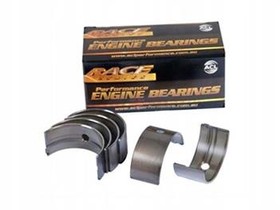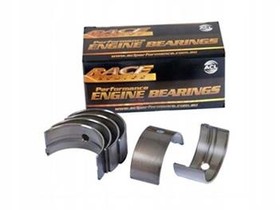Add products by adding codes
Repeating the code many times will add this item as many times as it appears.
Engine bearings
(number of products: 228)It is a fundamental element in internal combustion engines, playing a crucial role in the proper functioning of the propulsion system. It is a small but incredibly significant component that plays a key role in reducing friction between the rotating crankshaft and the connecting rod, ensuring smooth and efficient piston movement.



Engine bearing – what is it?
An engine bearing, also known as a connecting rod bearing, is a bushing or ring made of durable and wear-resistant material such as steel, bronze, or special metal alloys. Its shape is precisely matched to the connecting rod and crankshaft, allowing for stable mounting in the crankshaft assembly. Together with the piston and piston rings, the engine bearing forms the so-called crankshaft-piston mechanism, responsible for transforming the reciprocating motion of the piston into the rotary motion of the crankshaft.
Function of the engine bearing
The primary function of the engine bearing is to provide optimal friction reduction between the connecting rod and the crankshaft, which is crucial for the efficient operation of the engine. During engine operation, the piston moves up and down in the cylinder, driving the connecting rod in a rotary motion. It is the engine bearing that supports the weight of the piston and transmits the forces generated by the combustion of the fuel-air mixture in the combustion chamber. The bearing acts as a support for the connecting rod while ensuring the smooth rotary motion of the crankshaft.
Friction between the connecting rod and the crankshaft during engine operation can be significant, especially at high RPMs, which can lead to rapid wear and damage of these components. However, the use of automotive bearings made of materials with proper strength and an appropriate lubricating layer reduces friction resistance, minimizing wear and its negative impact on the engine's efficiency.
When high-quality engine bearings wear out or get damaged, undesirable symptoms may appear, such as unusual noises, a decrease in engine power, increased fuel consumption, or oil leaks. Therefore, it is essential to regularly check the condition of the engine bearings during technical inspections and respond to any concerning signs that may indicate the need for replacement.
Causes of engine bearing failure, symptoms, and replacement
Symptoms of engine bearing wear
Symptoms of damaged engine bearings should be taken into account and addressed promptly. The most common signs of a faulty bearing include:
- Strange noises: Noises like knocking, tapping, or whining emanating from the engine area may indicate issues with the bearings.
- Decreased engine power: Damaged bearings can lead to power loss and reduced engine performance, noticeable during driving.
- Increased oil level: Bearing damage may result in oil leaks, causing the oil level to rise on the dipstick.
- Uneven fuel combustion: Faulty bearings can affect uneven fuel combustion, leading to increased fuel consumption.
Causes of engine bearing failure
Several factors can lead to engine bearing rotation or damage. Among the most common causes are:
- Low oil pressure: Insufficient lubrication of the bearings, resulting from low oil levels or oil pump failure, can lead to bearing damage.
- Improper lubrication: Using the wrong oil or irregular oil changes can negatively impact the bearing's condition.
- Engine overload: Exceeding engine load parameters can cause higher friction and bearing wear.
Engine bearing replacement
In case of bearing damage or wear, prompt replacement is necessary, requiring a specialized approach and the skills of a mechanic. During the bearing replacement, it is recommended to check other components of the crankshaft-piston mechanism and thoroughly clean the piston and cylinder.
In summary, engine bearings are crucial components of the crankshaft-piston mechanism responsible for reducing friction between the connecting rod and the crankshaft. Regularly checking the condition of the bearings and responding to any signs of damage will prevent more severe issues and ensure smooth and reliable engine performance. If damage is detected, quick replacement by an experienced mechanic is necessary to restore optimal engine operation.
When should engine bearings be replaced?
Replacing the engine bearings as often as possible is recommended, even though there is no established norm, as in the case of oil changes in cars. Taking care of the engine's condition and regularly changing the oil helps eliminate the causes of engine bearing failure. In the long run, this approach is more cost-effective for vehicle owners. Owners should strive to prevent any symptoms of engine bearing wear from appearing. The primary symptoms include unusual noises emanating from the engine. Worn bearings often manifest as a distinct metallic knocking sound. It is best to verify the symptoms of bearing damage with a specialist in vehicle mechanics. Unfortunately, when an engine bearing fails, it will inevitably require the replacement of bearings and a full verification of the engine's interior and the entire oil system to ensure no metal shavings resulting from the damage have entered the system. Replacing engine bearings rarely involves just replacing the worn bearings alone. Repairing a spun bearing is not a simple or inexpensive procedure in our cars. The cost of bearing replacement can often exceed a hundreds of euros złotys.
We understand that selecting the right engine bearings is not a simple task, which is why our company is more than willing to provide assistance via email or telephone to help you choose high-quality bearings suitable for your vehicle.

















